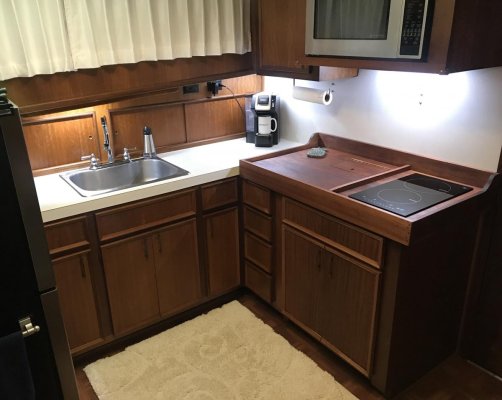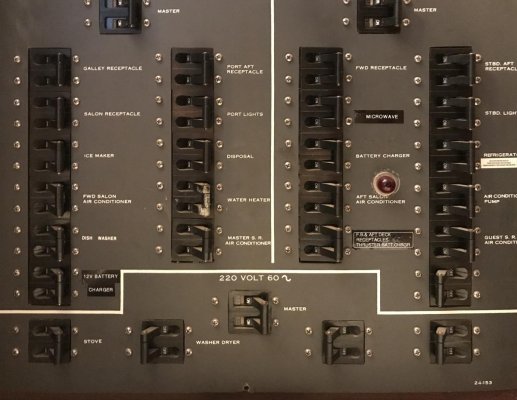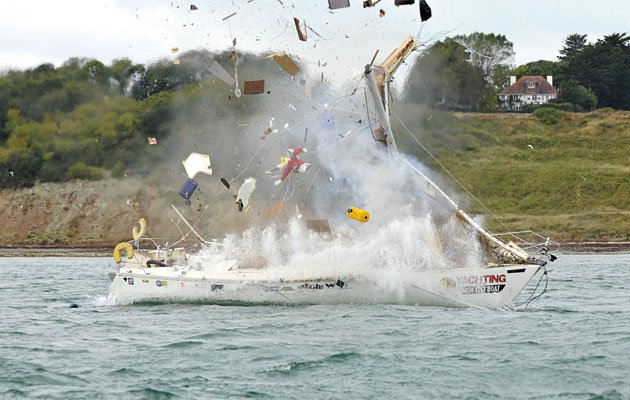Capt Ray
Senior Member
Lots of good info in these posts... Here is all I can add:
We purchased a 2000 Mainship 390 in July. After looking at several boats of this make/model for over a year, it was the only one we looked at with Propane. For a number of reasons we made our move and we are thrilled with it including the propane stove ... as the generator is loud. Our surveyor really liked the idea of it too.
Tank is 20# fiberglass on upper sun deck, has electric solenoid shut off under cover just inside canvased fly bridge. Obviously, the tank's valve needs to be open, 12 VDC power to the solenoid circuit needs to be on at the panel, and the solenoid switch at the galley needs to be "on". Each of the 3 burners and the oven has a thermocouple that needs to be "hot" or else fuel flow stops. The brand is Princess, which I don't think is available any longer, but there are others. Everything including the stove was in great condition.
The admiral really likes me NOT having to start the generator for my early up coffee every morning! All meals on the hook are great. Oven temp is amazingly accurate for a 20 year old stove. (Frozen Pizza is a fav.)
In our previous boat, we pulled out the alcohol stove and put in a counter top that housed a portable single burner S/S butane stove. If we had landed a boat with electric range, a single burner S/S butane stove would probably what we would use 99% of the time (when not on shore power.)
When putting in a propane appliance, I agree a certified professional install is peace of mind. I'm sure the USCG has regs as well as the boating safety orgs.
Our water heater does get hot off the main engine (180F), or shore power. (The high temp makes up for the small capacity.)
Note... several of our local propane refill stations were wigged out by the fiberglass propane tank. The local West Marine store who stocks them, pointed us to a couple of propane vendors who were perfectly OK with refilling it for us. (When we push off for the loop, we'll likely need ANY nearby propane vendor to fill without question. So a steel or aluminum tank may be in our future before we push off.)
The teak wood to the immediate left of the stove seems to not like the heat. We have refinished that wood... but we are watching to see how long it lasts. There are a lot of decorative S/S backsplash type finishes that might work out better. We'll see.
We purchased a 2000 Mainship 390 in July. After looking at several boats of this make/model for over a year, it was the only one we looked at with Propane. For a number of reasons we made our move and we are thrilled with it including the propane stove ... as the generator is loud. Our surveyor really liked the idea of it too.
Tank is 20# fiberglass on upper sun deck, has electric solenoid shut off under cover just inside canvased fly bridge. Obviously, the tank's valve needs to be open, 12 VDC power to the solenoid circuit needs to be on at the panel, and the solenoid switch at the galley needs to be "on". Each of the 3 burners and the oven has a thermocouple that needs to be "hot" or else fuel flow stops. The brand is Princess, which I don't think is available any longer, but there are others. Everything including the stove was in great condition.
The admiral really likes me NOT having to start the generator for my early up coffee every morning! All meals on the hook are great. Oven temp is amazingly accurate for a 20 year old stove. (Frozen Pizza is a fav.)
In our previous boat, we pulled out the alcohol stove and put in a counter top that housed a portable single burner S/S butane stove. If we had landed a boat with electric range, a single burner S/S butane stove would probably what we would use 99% of the time (when not on shore power.)
When putting in a propane appliance, I agree a certified professional install is peace of mind. I'm sure the USCG has regs as well as the boating safety orgs.
Our water heater does get hot off the main engine (180F), or shore power. (The high temp makes up for the small capacity.)
Note... several of our local propane refill stations were wigged out by the fiberglass propane tank. The local West Marine store who stocks them, pointed us to a couple of propane vendors who were perfectly OK with refilling it for us. (When we push off for the loop, we'll likely need ANY nearby propane vendor to fill without question. So a steel or aluminum tank may be in our future before we push off.)
The teak wood to the immediate left of the stove seems to not like the heat. We have refinished that wood... but we are watching to see how long it lasts. There are a lot of decorative S/S backsplash type finishes that might work out better. We'll see.
Last edited:



